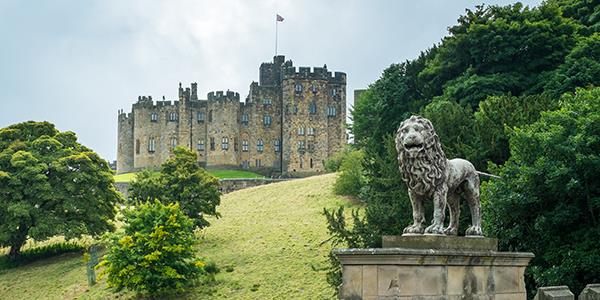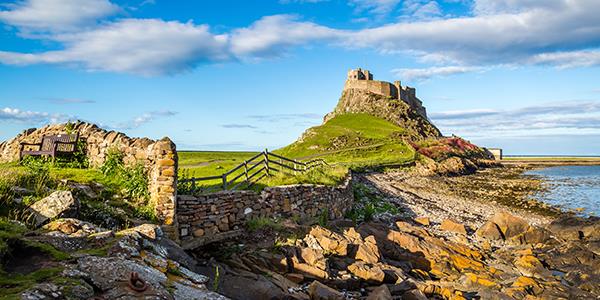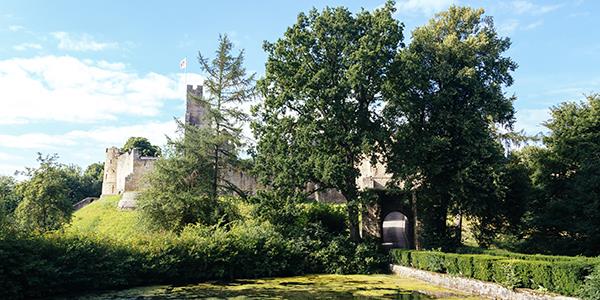
Northumberland is undoubtedly castle country…
Due to its position between Scotland and England, Northumberland has seen many conflicts and the huge quantity of stunning historic castles betrays a long and interesting history.
Each of the suites at Lucker Hall has been named after one of the county's many important castles. While you're here you'll want to pay a visit to one of Northumberland's famous locations. But there are so many, how to choose which one to go for?
Here's our list of top 7 Northumberland Castles to help you decide!
1. Lindisfarne Castle
Though not one of the oldest castles in this collection, the Lindisfarne castle is, perhaps, in one of the most iconic locations. It sits on the famous Holy Island of Lindisfarne, where the very first Viking raids took place in 793 CE. The castle was built in the 16th century and was transformed into a family home in the early 20th century. It's now in the care of the National Trust.

Why do we like it?
The location! Here we have great history and amazing views, so take some time to explore. The island and parts of the coastline have been awarded Nature Reserve status, so as you walk around the island (at low tide!) you're likely to spot a great amount of bird life.
How to find it?
Because it's a tidal island, the causeway from the mainland is submerged twice a day. Tide times can be found HERE. Travel north on the A1 from Lucker Hall and at Beal you'll meet the causeway.
www.nationaltrust.org.uk/lindisfarne-castle
2. Alnwick Castle
This spectacular castle has a history dating back 1,000 years! It is now the home of the Duke and Duchess of Northumberland. You're welcome to explore inside the impressive building, take a look at the grand rooms and exhibitions. The gardens are beautiful and there is a huge magical treehouse in the grounds.

Why do we like it?
It's great for a day out. There is always something going on at Alnwick with a full programme of events and family fun days to choose from. It's also been used for a lot of TV and film. Harry Potter, Downton Abbey and Robin Hood are just a few of them!
How to find it?
Follow the A1 south from Lucker Hall and join the B6341 into the town of Alnwick.
You can also learn more about the best castles in Northumberland by reading our guide.
3. Bamburgh Castle
Overlooking the coastline and Bamburgh beach, the castle is a huge complex that was restored to its current, impressive state over the course of the 18th, 19th and 20th centuries. But its history dates back much further. In fact, the first written reference to it was back in 547 CE! Having seen many different owners, it is now one of the largest inhabited castles in the country. You can explore inside the beautiful rooms and out in the grounds.

Why do we like it?
Bamburgh is just plain impressive! It's a large, restored castle perched on a rocky plateau overlooking the coastline. No wonder it's featured in films! The Normans built a large fortification on this site and it's this that forms the core of the present structure.
How to find it?
This castle is just a 10 minute drive from Lucker Hall. Follow the Lucker Road to Bamburgh on the coast. You can't miss the castle.
4. Dunstanburgh Castle
Owned by the National Trust, Dunstanburgh Castle consists of an impressive collection of ruins, sat on a low cliff, overlooking the sea. The castle was first built in the 14th century by Earl Thomas of Lancaster, though was later reappropriated as a stronghold during the Wars of the Roses.

Why do we like it?
Its solitary position and ruinous appearance make Dunstanburgh a very atmospheric castle. Even J. M. W. Turner sketched and painted a series of works depicting the ruin, some of which are on display at the Tate Britain Gallery.
How to find it?
About half an hour from Lucker Hall, Dunstanburgh sits on a slight headland just north of the coastal town of Craster.
www.english-heritage.org.uk/dunstanburgh-castle
5. Belsay Castle
This castle sits in the grounds of the Belsay Hall Estate, which has remained in the Middleton family for more than 700 years. An excellent pele tower survives from the 14th century and further additions were built onto the castle in the 17th and 18th centuries. It was the family home until the grand Belsay Hall was built nearby in the 19th century in a Greek-revival style.

Why do we like it?
Both Hall and castle are joined by stunning gardens, which provide absolutely charming walks through a range of themed areas. As well as the two magnificent buildings there is a stable block shop and a café, so at Belsay you can really make a full day of it.
How to find it?
The estate, which is cared for by the English Heritage, lies just outside the village of Belsay, just off the A696.
www.english-heritage.org.uk/belsay-castle
6. Chillingham Castle
For something a little different, Chillingham Castle may have originally been built in the 12th century, but it still looks every bit as stunning as it did in its heyday. With grounds designed by Capability Brown in the 18th century, this is now a popular wedding venue. There are woodland walks and a pretty lake plus a herd of rare breed wild cattle.

Why do we like it?
The ghostly goings on… We do love a little bit of mystery, and that's exactly what Chillingham offers! There are a number of ghost stories and reported sightings circulating these innocent looking walls.
How to find it?
Slightly further inland than some of our other castles, Chillingham can be reached from the B6348 and is close to the town of Chatton.
7. Prudhoe Castle
As the only Northumberland castle to resist the Scots, Prudhoe is a pretty special one. Though originally built in the 11th century, it was restored much later by the Percy family and much of the castle ruins are still in good condition today. It makes for a stunning sight, perched up on its hill on the banks of the Tyne. You can learn about the history in the exhibition or visit the little shop and café.

Why do we like it?
We think this little gem is underappreciated. It is a really well preserved ruin and its size, along with its surroundings mean you can enjoy a good walk as you explore. There are trees and even a little mill pond.
How to find it?
Slightly inland, Prudhoe was one of a number of castles built along the River Tyne after 1066. The town is located just west of Newcastle and can be reached off the A1 and A695.
www.english-heritage.org.uk/prudhoe-castle

